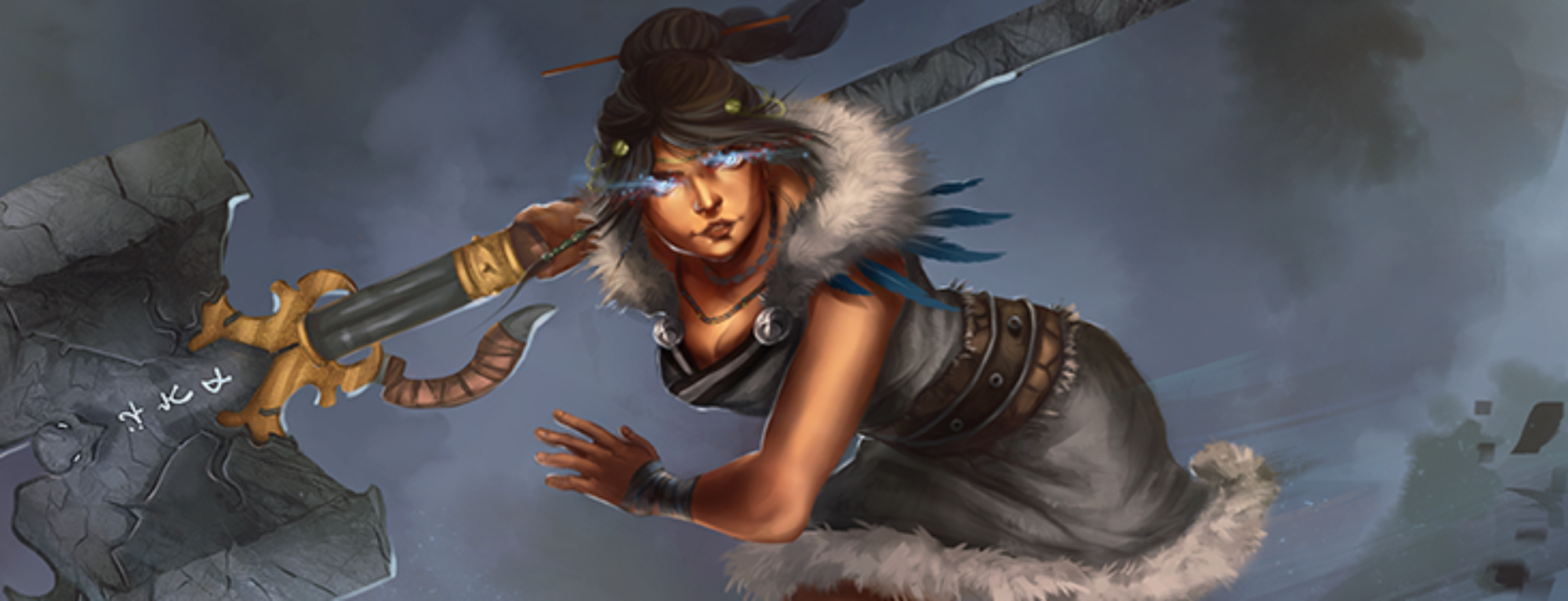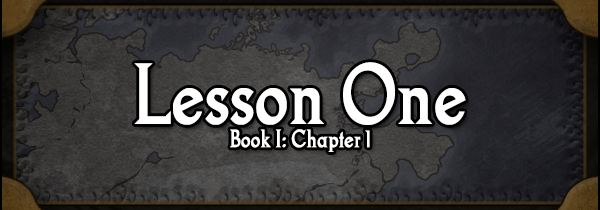Lesson One
The wind was soft among the pines, and a few flakes of snow came quietly to rest on the deck of the ship, the gangplank, and the grass below. Mathilde took a long breath of the bracing fresh air and listened to the creak of the canvas gasbag swaying overhead. After thirteen years of service in the Capulan Sky Command, she could hear a gas leak or the snap of a vent stitch from belowdecks in a thunderstorm. By all accounts, the Callista was in perfect shape.
A gust of wind passed through the valley and tipped the whole craft back on its keel. Grounding lines snapped taught and the boards groaned in protest. It only took a moment for the ship to settle back to earth.
“Andre!” Mathilde called. “Explain yourself! Why isn’t this ship in a stable landing position?”
The master rigger dropped down from overhead, his feet crooked through the rungs of a rope ladder.
“It’s the elevation, ma’am. Up here in the mountains, the air pressure is too light. I’m afraid I’ll burst the ballonets if I pump them any further, and we’re just not getting enough compression.”
“Then we need to take on ballast. If this gasbag swings into those pines, we’ll be walking the rest of the way to Ovog. See to it!”
“Right away, captain!”
Andre clambered back up to the gasbag to find volunteers while Mathilde made her way to the gangplank and descended, her boots knocking the plank like a drum. Arrayed in the field beside the ship were her three students. Strange to see so many under her command out of uniform, but of course there were no uniforms for a rogue dueling academy without even a name or a charter. Each wore the costume of their people, and each followed their own customs.
“Roll call!” she shouted. “Present yourselves when you hear your name!”
One by one, she called them to formation:
Tremen, the young knight-errant of the Order of the Fading Light, came forward in his ancestral armor, which glimmered in the clear light of morning. Despite the sun, he cast no shadow.
Violet, a pirate and sailor from the Thousand Shores, still kept her hair in the long, beaded braids that signified rank among her brethren. She twirled her Torbellino cutlass in her hand and smirked at her teacher.
Shagash was the strangest. His hair black, his skin pale, he stood silently beside the other two, wrapped in a black sarape that covered his arms and made him look like a ghost. The pale bone-carved blade of his Pemburu spear seemed to perch like a bird behind his shoulder.
“Today we’ll be covering first principles,” Mathilde said, pacing before her class with her hands behind her back. “I’ve selected you for the skills you’ve already demonstrated. But before we can advance your technique, we need to start from lesson one.”
“Dolphin farts to that!” Violet sneered, her sword flashing. “I had my first lesson six years ago!”
“Then you ought to know your finger’s on the trigger,” Mathilde replied. “And you ought to know that where I come from, that’s considered a formal challenge to the death. Keep that trigger finger in line or I’ll have you practicing in mittens for a month.”
The young woman tossed her beaded hair haughtily, but adjusted her grip. Defiant though she was, Violet would never defy the captain of her ship.
“Now then,” said Mathilde. “You’ve all been in fights before, so you know that in any duel, the deciding factor is your momentum. Maintaining proper momentum puts you in control of the fight. You take the initiative while your foe is on the defensive. Overextend, and you’ll leave yourself open. Play it too coy, and you won’t capitalize on your advantage.
“While you have the initiative, your options are many. The gunsword is such a versatile weapon, so varied in form and function, that an attacker is limited only by her imagination and her experience. But when you’re on the defensive, your options are perilously few.”
As she spoke, she unsheathed one of her paired flintlock sabers and checked its shell chamber to ensure it was empty. Satisfied, she unscrewed the tab at the base of the hammer mechanism and removed the hammer completely, slipping it into her pocket. After showing her students that the weapon was neutralized, she settled into a relaxed fighting stance.
“Today I will be demonstrating the fundamental options available to you when your foe has the initiative,” she said. “As our Master at Arms always says, the best offense is a good defense. Now which one of you wants to spar?”
To her surprise, Shagash stepped forward immediately, spear already in hand. As always, the look in his eyes was patient and cold, almost reptilian. Mathilde cocked her head and made note of the notches in the shaft of the spear, near the base of the blade.
“Give me one good attack,” she said. “This is just a demonstration, but make it count.”
The student squared off into his stance, took a deep breath, and charged forward, spear down, the thrust easy to predict. Mathilde was out of the way before he could bring up the strike, her coat rippling as she spun to face her opponent. Shagash slid in the grass as his missed attack carried him forward, but to his credit his guard was not down for long. He turned, ready, and watched.
“The simplest technique is the most reliable,” Mathilde said. “Just dodge the attack. Remember that a combat dodge leaves you in a good position to take advantage. It’s more than just getting out of the way. Running around will just leave you winded.
“Now, Shagash. Again, please.”
This time Shagash needed no preparation. He sprang ahead, blade high, the muscles of his arms coiling with effort as he brought down the weight of the spear. But Mathilde was too fast, her saber already up, the blade buried in the notch at the base of Shagash’s weapon. By reflex, Mathilde spread her stance to arrest her attacker’s movement. Frustrated, Shagash pulled away.
“Blocking an attack, or at least deflecting the prime thrust, is efficient and hard to anticipate,” Mathilde explained. “But it will leave you with fewer options and in close quarters.”
Shagash prowled back and forth on the grass, his hair hanging in his face. He was beginning to look the way he’d looked when Mathilde first met him in the southern forest, near feral, with the eyes of a predator. It was nearly time to end the lesson.
“One more time, please,” Mathilde said. “And make it a good one.”
For the first time, Shagash broke eye contact and studied the ground. His knuckles were white around the spear.
“I don’t want to hurt you,” he said.
Mathilde smiled and said, “Don’t worry about it.”
The attack was swift, harder to read than the others. Feinting a thrust, Shagash sidestepped just before contact and swung wide, his spear a crescent in the cold air. But it wasn’t swift enough to stop Mathilde from catching the blade in the spikes under her flintlock barrel. With a wrench of her wrist, she took control of Shagash’s path and sidestepped with him, leaving him stumbling, his weapon so far clear of contact that any attack Mathilde made was sure to hit.
The snow had begun to fall more heavily, and by then both fighters were breathing hard, white puffs floating from their mouths. Shagash appeared dumbfounded, but he retained his composure and stood tall, no longer in a fighting stance, ready to finish sparring.
“That’s the breaker,” said Mathilde. “You use your foe’s power against them. It’s risky and it can get you hurt, but one well-timed breaker can determine the outcome of a duel.”
Before she could explain further, she was distracted by a metallic crash somewhere beyond the treeline, like the sound of a giant cooking pan falling down a flight of stairs.
Louder still came the cry: “Hell’s bells!” the voice of her Master at Arms so loud that it startled birds to flight. Before long, his approach was audible, snapping branches and crushing underbrush. When he emerged into the field, Warburton came dragging a tree limb behind him, the fir caught in his armor. Stuck to his pauldron was a heavy-looking hunk of rock that glimmered with metal ore. He came clanking up to the assembled students and threw back the visor of his helmet to snap a salute.
“How do you like the camouflage?” he smiled. “Didn’t even see me coming, did you?”
“Warburton, I think we need to have a discussion about reconnaissance tactics,” Mathilde replied. “What the hell’s that on your shoulder?”
Warburton wrenched the stone free and held it out. The granite was veined with shimmering metal that looked like silver dust.
“Magnetic ore,” said the Master at Arms. “These mountains are packed with it. Could be useful if we can bring some home for smelting. Maybe upgrade the turbines? Get a little torque in the old girl?”
“It’s going to play havoc with our navigation,” Mathilde huffed. “Get Brixley to draw a skyline of these peaks. We’ll have to use landmarks to find north, because our compass will be about as useful as a dinner plate”
“As long as we’re on the subject,” said Warburton, removing his helmet. “Wouldn’t you say it’s about time for some midday rations?”
Mathilde sensed her students perking up. Even Shagash seemed excited by the idea of a meal, and Violet had finally stopped twirling her cutlass.
With a roll of her eyes, she turned and said, “Dismissed for mealtime. Report back here at two past noon, not a second later.”
“Instructor, wait,” said Tremen, his accent heavy on the R’s. “Is not there another counter? In my Order, we call it ‘riposte’?”
Mathilde smiled and took the flintlock hammer back out of her pocket.
“That’s right,” she replied, reassembling the mechanism. “You meet the attack with an attack of your own. To demonstrate, we’ll need rubberized rounds for everyone’s weapons. Warburton can show you where to find them after he’s given me his report.”
“Report comes after lunch, right?” Warburton asked, his broad white grin shining.
“Report before lunch,” said Mathilde. “I need to know the Oracle’s movements. How much further can we go airborne? I don’t care if the Chonokhat know we’re here, but we’re flying Capulan colors and I don’t need to be responsible for another border incursion.”
Warburton followed her back to the ship as the students dispersed. Smoke from a campfire rose in a grey trail toward the clouds, while the snow seemed to flirt with the closing days of autumn. Overhead, some of the birds flew home, but others circled, watching.
Before long, all the green grass would be white.

